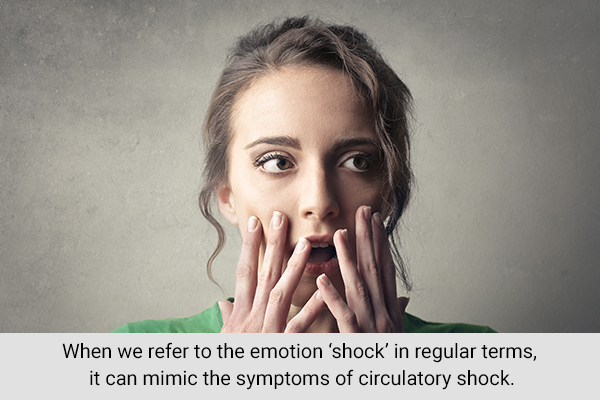In this article:
Most doctors and psychologists agree that there is a certain “mind–body” connection that causes physical manifestations of emotional health.

In short, your feelings and emotions can affect your physical health. Constant stress, anxiety, and anger are negative feelings that have a negative impact on your body in the long run. (1)
Read on to know more about how emotions and feelings can affect your general health. (2)
How Emotions Impact Your Health
Fear and anxiety are simple emotions that help keep you away from danger or warn you about a potentially dangerous situation. However, being constantly fearful, or chronic anxiety, can have negative effects on the body.
Here are a few known harmful effects of chronic anxiety:
1. Formation of gastric ulcers
Chronic anxiety has been linked to inflammation and the formation of gastric ulcers in some people. (3)
2. Heart disease, asthma, and hypertension
Elevated stress levels may cause an increased risk of heart disease, hypertension, respiratory issues, and neurological disorders such as Alzheimer’s disease. (4)
How Anger Impacts Your Health

Anger is one of the most harmful emotions to feel. Although it is natural to get angry at some things, it is important to learn to control your anger and keep a cool head at all times.
Research shows that even 5 minutes of anger can negatively impact your immune system. Moreover, prolonged anger may cause an increase in heart rate, blood pressure, and headaches and put you at risk of strokes, among other problems. (5)(6)(7)
How Sadness/Grief Impact Your Health
Grief is a natural part of life. You may grieve over losing loved ones, losing an important relationship, or other kinds of loss.
However, overcoming your grief and moving on in life is essential as prolonged sadness can have lots of negative effects on the body, (8)(9) such as the following:
1. Sickness, body pain, and fatigue due to immune dysfunction
Grief tends to cause inflammatory responses in the body. In the long run, this can impair your immune system. (10)
2. Cardiac problems, cancer risk, and diabetes hypersensitivity
Increased levels of stress hormones produced in periods of grief can put you at risk of major health disorders such as heart disease, cancer, and diabetes. (10)
3. Depression, insomnia, nausea, vomiting, and abdominal pain
Grief can cause minor changes in your sympathetic nervous system and lead to depression, sleep disorders, and inflammation in the gastrointestinal tract. (11)
How Hatred Impact Your Health
Hate is a very strong emotion that can wreak havoc on your health. It can lead to an increase in all kinds of negative emotions such as anxiety, fear, and anger.
All these factors combined may lead to high blood pressure, heart problems, headaches, and decreased blood circulation. Moreover, people who have been brainwashed by hate or even victims of hate can develop serious psychological issues in their lives. (12)(5)
How Jealousy Impacts Your Health

Jealousy is a common and extremely normal emotion to feel. Most people have insecurities and attachments that may lead to occasional feelings of jealousy towards other people.
However, you need to learn to get over and address your feelings. According to psychologists, chronic jealousy can be very harmful to health. It can disrupt your mental peace, cause sleeplessness, increase your heart rate, and lead to a loss of appetite. (13)
How Stress and Worries Impact Your Health
Prolonged stress and worrying can take a toll on your mental as well as physical health. Even periods of acute stress can manifest as physical symptoms (for example, feeling nauseous when you are very nervous).
Chronic stress can cause a narrowing of blood vessels (vasoconstriction), blood clots, and heart problems in the long run. (14)
How Shock Impacts Your Health

In the field of medicine, the term “shock” has a different meaning from its regular layman’s use. It occurs due to a shortage of blood circulating in the body.
The body’s initial response to this condition is a narrowing of the blood vessels in the hands and feet. Adrenaline (the fight or flight hormone) is also released, and it can indirectly cause a drop in blood pressure under such circumstances.
The emotion “shock” in regular terms can mimic the symptoms of circulatory shock. Hence, your blood pressure may drop, adrenaline is released, etc. Fortunately, you can recover quickly after some comforting and processing your feelings. (15)
Final Word
Emotions are an integral part of day-to-day life. It is important to process your feelings and emotions in the right ways instead of shutting them down or getting carried away.
Try to enhance positive emotions such as happiness, love, and gratitude for a healthier and more fulfilling life. If you are having trouble controlling your emotions or tend to get too sad, angry, or moody regularly, it can be helpful to consult a therapist.
Licensed therapists or psychologists are trained medical professionals who can help you manage your mental health.
- Was this article helpful?
- YES, THANKS!NOT REALLY


